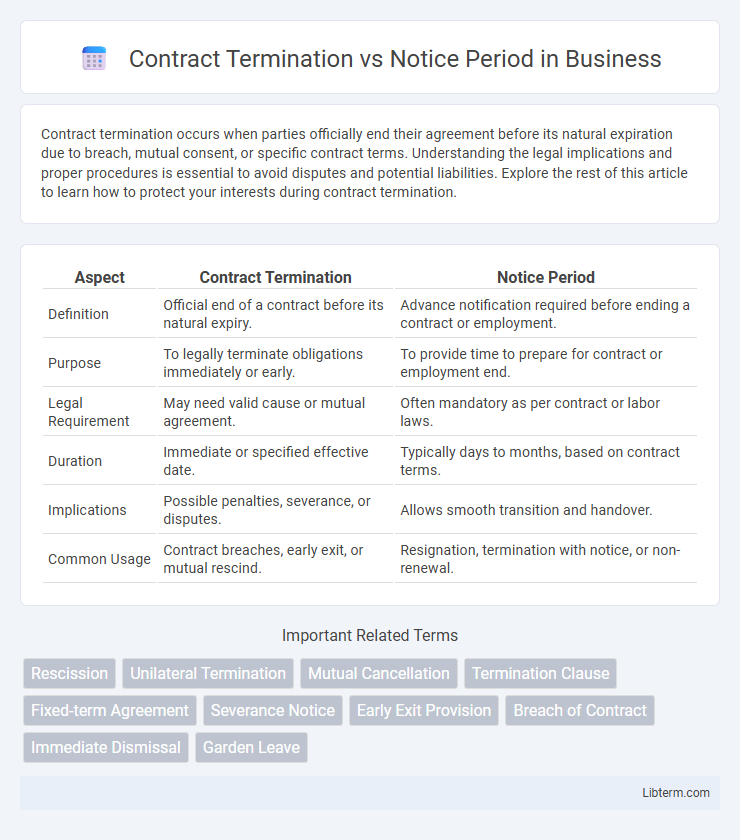Contract termination occurs when parties officially end their agreement before its natural expiration due to breach, mutual consent, or specific contract terms. Understanding the legal implications and proper procedures is essential to avoid disputes and potential liabilities. Explore the rest of this article to learn how to protect your interests during contract termination.
Table of Comparison
| Aspect | Contract Termination | Notice Period |
|---|---|---|
| Definition | Official end of a contract before its natural expiry. | Advance notification required before ending a contract or employment. |
| Purpose | To legally terminate obligations immediately or early. | To provide time to prepare for contract or employment end. |
| Legal Requirement | May need valid cause or mutual agreement. | Often mandatory as per contract or labor laws. |
| Duration | Immediate or specified effective date. | Typically days to months, based on contract terms. |
| Implications | Possible penalties, severance, or disputes. | Allows smooth transition and handover. |
| Common Usage | Contract breaches, early exit, or mutual rescind. | Resignation, termination with notice, or non-renewal. |
Understanding Contract Termination
Contract termination involves the legal ending of an agreement between parties before its scheduled expiration, which can occur due to breach, mutual consent, or frustration of purpose. Understanding contract termination requires awareness of specific clauses, such as termination for cause or convenience, and the consequences outlined in the agreement. Notice periods are often stipulated within contracts to provide a defined timeframe for parties to communicate termination intentions, ensuring lawful and orderly dissolution of contractual obligations.
Defining Notice Period in Employment
Notice period in employment refers to the specified duration an employee or employer must provide before terminating the contract, ensuring legal and procedural compliance. This period allows both parties to prepare for the transition, facilitating orderly handover of duties and minimizing operational disruptions. Contract termination without honoring the agreed notice period can result in legal consequences and potential financial liabilities under labor laws.
Key Differences Between Contract Termination and Notice Period
Contract termination refers to the formal ending of a contractual agreement before its natural expiration, often triggered by breach or mutual consent, whereas the notice period is the predefined time frame an employee or party must provide before ending the contract. Contract termination can occur immediately in cases of gross misconduct, while the notice period ensures a smooth transition by allowing time for handover or replacement. Understanding these distinctions is crucial for ensuring compliance with labor laws and protecting the rights and obligations of all parties involved.
Legal Framework Governing Both Concepts
The legal framework governing contract termination and notice periods primarily involves labor laws and employment regulations that define the rights and obligations of both employers and employees. Contract termination requires adherence to specific grounds such as breach of contract, just cause, or mutual agreement, often necessitating formal documentation and compliance with statutory procedures. Notice periods are mandated by labor statutes to ensure fair warning before ending employment, stipulating minimum duration, payment in lieu, and conditions for waiving or extending the notice depending on jurisdiction.
Common Reasons for Contract Termination
Common reasons for contract termination include breach of contract, non-performance, mutual agreement, and expiration of the contract term. Notice period requirements vary by jurisdiction and contract type but typically allow the non-breaching party time to prepare for the end of the contractual relationship. Understanding these causes helps businesses manage risks and ensure compliance with legal obligations during the termination process.
Employer and Employee Rights During Notice Period
During the notice period, employers must uphold obligations such as continued salary payment and adherence to agreed working conditions while allowing employees the right to utilize their remaining workdays for job search or transition activities. Employees have the right to a fair notice period as stipulated in their contract or labor laws, ensuring sufficient time to secure alternative employment without sudden dismissal. Both parties retain the right to negotiate terms of early contract termination or adjustment of notice duration, provided mutual consent and legal compliance are maintained.
Financial Implications of Early Contract Termination
Early contract termination often triggers significant financial penalties, including forfeiture of deposits, payment of liquidated damages, or accelerated payment of remaining contract value. Notice period compliance may mitigate such penalties by providing the other party sufficient time to adjust or find alternatives, thereby reducing potential compensation claims. Understanding specific contract clauses related to termination fees and notice obligations is critical to avoid unexpected financial liabilities.
How to Properly Serve a Notice Period
Properly serving a notice period requires clear communication through a written notice that specifies the intended last working day, complying with the terms outlined in the employment contract or labor laws. Employers and employees must ensure the notice period duration meets contractual obligations, typically ranging from one to three months depending on jurisdiction and job role. Maintaining professionalism during this time, including fulfilling job responsibilities and participating in handover processes, facilitates a smooth transition and minimizes legal risks associated with contract termination.
Preventing Legal Disputes in Contract Endings
Clear definitions of contract termination and notice period terms are vital for preventing legal disputes in contract endings. Ensuring both parties understand and adhere to the agreed notice period reduces the risk of claims related to wrongful termination or breach of contract. Effective communication and documentation during contract conclusion safeguard legal compliance and foster amicable resolutions.
Best Practices for Managing Employment Separation
Effective management of contract termination and notice periods involves clear communication of terms outlined in the employment agreement to ensure legal compliance and minimize disputes. Employers should provide written notice specifying duration, reasons for termination, and employee rights, aligning with local labor laws and organizational policies. Maintaining transparent documentation and offering support during the transition enhances trust and reduces risks associated with abrupt separations.
Contract Termination Infographic

 libterm.com
libterm.com